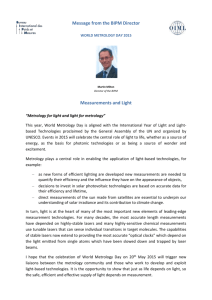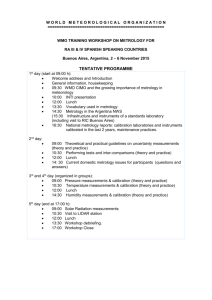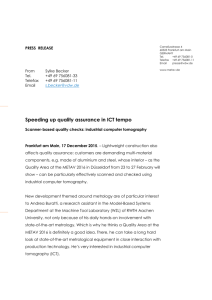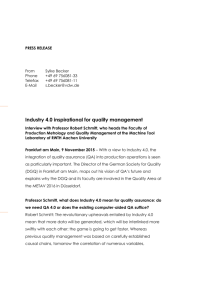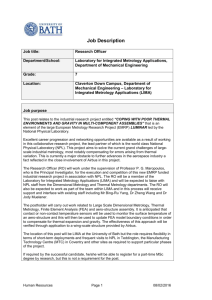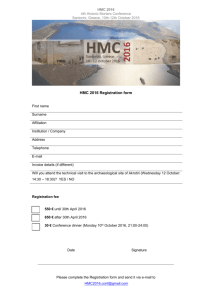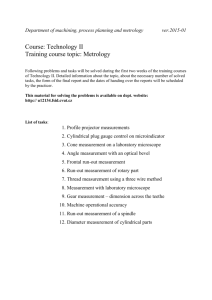Industry 4.0: inline metrology on the up
advertisement
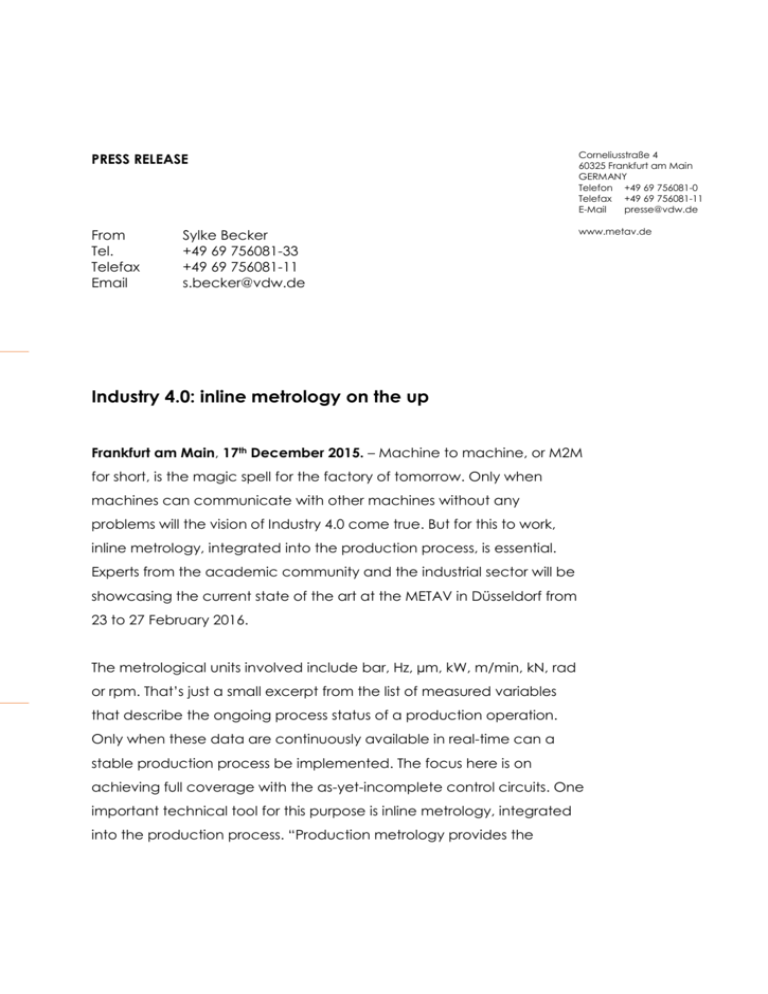
PRESS RELEASE Corneliusstraße 4 60325 Frankfurt am Main GERMANY Telefon +49 69 756081-0 Telefax +49 69 756081-11 E-Mail presse@vdw.de From Tel. Telefax Email www.metav.de Sylke Becker +49 69 756081-33 +49 69 756081-11 s.becker@vdw.de Industry 4.0: inline metrology on the up Frankfurt am Main, 17th December 2015. – Machine to machine, or M2M for short, is the magic spell for the factory of tomorrow. Only when machines can communicate with other machines without any problems will the vision of Industry 4.0 come true. But for this to work, inline metrology, integrated into the production process, is essential. Experts from the academic community and the industrial sector will be showcasing the current state of the art at the METAV in Düsseldorf from 23 to 27 February 2016. The metrological units involved include bar, Hz, µm, kW, m/min, kN, rad or rpm. That’s just a small excerpt from the list of measured variables that describe the ongoing process status of a production operation. Only when these data are continuously available in real-time can a stable production process be implemented. The focus here is on achieving full coverage with the as-yet-incomplete control circuits. One important technical tool for this purpose is inline metrology, integrated into the production process. “Production metrology provides the Page 2 / 8 METAV 2016 foundations for imaging the real factory world,” explains Walter Kimmelmann, who heads the Model-Based Systems Department at the Faculty for Production Metrology and Quality Management of the Machine Tool Laboratory at RWTH in Aachen University. “With the data thus acquired and evaluated, the ideal operating points can be determined and optimised in a model world, and then serve as manipulated variables for controlling the real production world,” to quote the expert. Metrology: ten times better than the tolerance For this job profile, very sturdy and durable sensor technology is needed, which can always be relied upon to function dependably round the clock in a machine tool even under what are sometimes very harsh environmental conditions. “The golden rule of metrology applies here,” emphasises Walter Kimmelmann. “It has to be better than the anticipated tolerance by a factor of 10.” After all, the production staff can only intervene sensibly in the process if they’re getting soundly based, dependable measured data. But how can a thoroughbred machine tool be transformed into a valid measuring system? “The advantage of using a classical three- or fiveaxis system for measuring purposes is that it has the same kinematics as a coordinate measuring machine,” comments Machine Tool Laboratory Group Leader Martin Peterek. “This means that similar procedures and guidelines can be used. The aim is to determine a measuring uncertainty for the measuring process, because it’s only by specifying a measuring uncertainty that the measurements will supply a usable statement.” However, it must be remembered that the machine tool and in particular the workplace environment possess some characteristics that are metrologically disadvantageous. Requirements include precise knowledge of the geometrical errors and behaviours encountered during machining and measuring, so as to compensate Page 3 / 8 METAV 2016 for disturbance variables with fit-for-purpose metrological equipment and software. To quote Martin Peterek: “Anyone planning to upgrade to a measuring machine should accordingly involve us at a very early stage. This is essential in order to obtain a machine that provides feedback featuring a significantly reduced degree of measuring uncertainty. The requisite steps involved, from mapping out the measuring strategy to determining the measuring uncertainty, are supported by a software package developed in-house. This enables the user to give other machines a measuring capability as well. The acquisition, processing and forwarding of the data concerned are accordingly crucial to the success of the metrological operations integrated into the process. Only when the measured data and thus the information on the product and the process are available can they be utilised for purposes of process control.” “If a manufacturer takes advice from metrological experts like us at an early stage, he will get a machine tool that not only gives more accurate measurements but also produces more precisely machined parts,” adds Walter Kimmelmann. “Robots, by the way, can also be used as dedicated measuring machines. We utilise robots in conjunction with cameras and laser scanners for digitising unknown contours of large, complex components, for example.” Laser-based metrology has proved its worth In recent years, laser-based measuring systems have proved their worth in Aachen, since they exert only a slight influence on the manufacturing process. Other processes, such as inclination scales, are also options, but have to be permanently installed in the machine. “We opt almost entirely for light-based technologies, rooted in modern-day coordinate measuring equipment,” says Martin Peterek. “Optics are going to increasingly displace tactile processes, since you obtain significantly more information in a shorter time.” The possibilities opened up by Page 4 / 8 METAV 2016 optical metrology in interaction with the industrial sector are demonstrated by a robot cell for assembling truck drivers’ cabs. To quote Walter Kimmelmann: “An external, mobile coordinate measuring system on an optical basis acquires the location of the truck cab on an assembly line, and the entire surroundings in six degrees of freedom, so that the robot “knows” how and where, for example, it fits a windscreen to an accuracy of 100 to 200 µm.” Despite these developments, the external measuring room is not passé. “I am confident that it will continue to have its justified place, since some things cannot be measured with the requisite precision, even with specialised machine tools,” says Martin Peterek. “For complex tasks with stringent requirements for accuracy, the enclosed measuring room with temperature compensation will accordingly still be a viable option – in approval processes, for example.” It’s not only because of the multitudinous questions themed around production metrology that the two experts think a Quality Area at the METAV 2016 is a good idea. The Group Leader interprets it as a significant upgrading in the perceived importance of his specialism, since “we basically have the appropriate metrological equipment for machine tools, robotics, and a vast majority of automation solutions”. Prof. Dr.-Ing. Robert Schmitt, who heads the Faculty of Production Metrology and Quality Management, and is Director of the German Society for Quality (DGQ) sees the Quality Area not least as an opportunity “to break down the functional-organisational walls between the production and metrological specialisms”. February 2016: a good moment for new trade fair approaches “The moment is well chosen for breaking new ground with the METAV in February 2016 – a few months after the EMO in Milan,” opines Ulrich Löhr, Managing Director of m&h Inprocess Messtechnik GmbH from Page 5 / 8 METAV 2016 Waldburg. “We are confident that the Quality Area will prove highly invigorating, and together with our partners Edgecam and Work NC will under the logo of Hexagon Manufacturing Intelligence be showcasing production and metrology solutions directly on the machine tool.” m&h will at the METAV be exhibiting probes and software, enabling “the most direct form of inline metrology” to be implemented. “Our technology is used in the machine in which it also measures data directly in the process,” explains Ulrich Löhr. “An important role is played by the CAD-based program 3D Form Inspect, which reads in the user’s 3D CAD model.” Thanks to the software, control geometries plus shapes on all sides can be quickly and easily measured and recorded directly on the machine tool. The software transfers all defined measuring points to the machine’s control system. On the machine itself, a direct target-actual comparison is performed, in which the component concerned is measured in its clamped state. “Our patented calibration strategy enables us to achieve precise measurements in 3-axis and 5-axis machine tools,” says the Managing Director. “This means we can measure inside the machine’s positioning accuracy.” For this purpose, the software acquires kinematic changes, different axis behaviours like tracking errors and thermal shifts in the workroom. All these factors are taken into due account by 3D Form Inspect, which compensates for them automatically during the measuring operation. Further processing on all levels and axes To also enable machine operators to handle complex measuring jobs quickly and easily without any prior knowledge of programming, 3D Form Inspect can be operated intuitively. For this purpose, they simply specify the measuring points with a mouse-click, whereupon these are transferred automatically to the control system. The measurements and Page 6 / 8 METAV 2016 the log correspond to the actual state of the component concerned in regard to the machining zero point. Thanks to a special software function, a log can be created that corresponds to that of a coordinate measuring instrument. Within the machining operation, the component can, with the aid of the “best-fit” option, be completely realigned and further machined at any time on all levels and axes. Whereas previously the software was used primarily in tool and mould construction, nowadays, according to m&h, it’s deployed in numerous branches of industry, by automakers, the energy sector, all the way through to the aerospace industry. One of the benefits, says Ulrich Löhr, is using it with complex component shapes, without any straight reference surfaces, which otherwise can be clamped and aligned only in an elaborate procedure. An important role is also played by the hardware, where the company is proud of the “smallest infrared probe on the market”, which thanks to a tiny diameter of just 25 mm can also be used in extremely small high-precision machine tools, in the watchmaking or medical technology sectors, for example. Another advantage cited by Ulrich Löhr is the versatility of the evaluation function. To quote the Managing Director: “Some users send the measurement reports for each individual component directly to their customers. Others use the program for no longer measuring every component on the coordinate measuring instrument, which now checks only random samples.” Author: Nikolaus Fecht, specialist journalist from Gelsenkirchen Number of characters including blanks: 10 219 Page 7 / 8 METAV 2016 Background Faculty for Production Metrology and Quality Management, RWTH Aachen University The Faculty for Production Metrology and Quality Management at the Machine Tool Laboratory of RWTH Aachen University performs research and teaching in the following core specialisms: development and optimisation of measuring processes and instruments, production-integrated metrology and close-to-machine quality control circuits, quality management systems, knowledge, innovation and improvement management, plus methods and computer support for quality management. Further information under: www.wzl.rwth-aachen.de/de/mq_lehre.htm m&h inprocess messtechnik GmbH, Waldburg The subsidiary of Hexagon Metrology Services Ltd. from Cobham in the UK produces probes that measure workpieces on milling machines, machining centres, lathes, turning and milling centres, grinding machines, specialised machines and robots. They can be used not only for aligning workpieces in small batches and in medium to largeseries manufacturing operations, but also for inspecting geometries directly in the machine. Turnover (Hexagon) 2014: 2.6 billion euros; employees (Hexagon) 2014: 14,864. Further information under: www.mh-inprocess.com METAV 2016 in Düsseldorf The METAV 2016 – the 19th International Exhibition for Metalworking Technologies – will be held in Düsseldorf from 23 to 27 February. It showcases the entire spectrum of production technology. The principal focuses are machine tools, production systems, high-precision tools, automated material flows, computer technology, industrial electronics, and accessories, complemented by the new themes of Moulding, Medical, Additive Manufacturing and Quality, which are now permanently anchored in what are called “areas” with their own nomenclature in the METAV’s exhibition programme. The METAV’s target group for visitors includes all branches of industry that work metal, particularly machinery and plant manufacturers, the automotive industry and its component suppliers, aerospace, the electrical engineering industry, energy and medical technologies, tool and mould-making, plus metalworking and the craft sector. Quality Area at the METAV 2016 Methods for quality assurance are developing at a rapid pace, belong in every manufacturing process, and are therefore of interest to all production experts. One of the crucial elements for quality is modern-day metrology. Users are demanding progressively shorter measuring times, which is why more and more functions are being integrated into the individual machines. In addition, consistent processing of the measured results during the course of machine monitoring and process control is gaining steadily in perceived importance. Industry 4.0 is now being complemented by Quality 4.0. The Quality Area is ideally intermeshed in the keynote topics addressed by the METAV, and the declared aim of ensuring high standards of quality throughout all phases of the production process. It showcases the entire bandwidth of measuring and testing technology, plus QM and analytical systems.. Further information under: www.metav.de Page 8 / 8 METAV 2016 Your contact persons VDW (German Machine Tool Builders’ Association) Sylke Becker Press and Public Relations Corneliusstrasse 4 60325 Frankfurt am Main GERMANY Tel. +49 69 756081-33 s.becker@vdw.de www.vdw.de m&h inprocess messtechnik GmbH Karl-Heinz Helfrich Marketing Am Langholz 11 88289 Waldburg GERMANY Tel. +49 7529 97330 karl-heinz.helfrich@hexagonmetrology.com www. hexagonmetrology.com Machine Tool Laboratory (WZL) of RWTH Aachen Reinhard Freudenberg Press and Public Relations Steinbachstr. 19 52074 Aachen GERMANY Tel. +49 241 80-27614 r.freudenberg@wzl.rwth-aachen.de www.wzl.rwth-aachen.de Press Agency Dipl.-Ing. Nikolaus Fecht Technical texts à la carte – when words fail you Nikolaus Fecht Husemannstrasse 29 45879 Gelsenkirchen GERMANY Tel. +49 209 26575 nikofecht@erzfreunde.de You will find texts and pictures on the internet under www.metav.de in Press Service. You can also visit the METAV through our social media channels: http://twitter.com/METAVonline http://facebook.com/METAV.fanpage http://www.youtube.com/metaltradefair https://de.industryarena.com/metav
